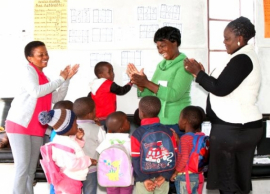
Government is expected to step up spending on the “social wage” over the next three years to bring much needed financial boosts to sectors such as health, education, housing and transport.
This was announced by Finance Minister Enoch Godongwana during the Medium Term Budget Policy Statement – or mini budget – in Parliament this afternoon.
“The social wage, totalling R3.56 trillion over the next three years, or 59.2% of the consolidated non-interest spending, will take up the biggest share of the budget in support of poor households and the most vulnerable in our society.
“The largest allocations are directed to the education, health and social development sectors,” he said.
Health
According to National Treasury, additional fund allocations will now allow the Health Department to address backlogs and other health services.
“The public health sector experienced two years of severe strain from the COVID-19 pandemic and disruptions to routine healthcare services. As the immediate pressure from the pandemic eases, COVID-19 vaccinations are being integrated into general health services from separate vaccination sites. Over the MTEF period, the sector will refocus on other core health services and address accumulated backlogs.
“The 2023 Budget will partly reverse the real reduction in provincial health budgets that occurred following the pandemic, although greater efficiency is also needed. Additional funds will be provided to alleviate critical funding pressures in areas such as healthcare personnel, medicine, laboratory services, medical supplies, and critical goods and services,” the department said.
Additional funds will also be made available to build the new Limpopo Central Hospital in Polokwane.
Education
According to National Treasury, spending on education is expected to increase, with mid-term estimates indicating that government will spend is excess of R330 billion on the sector.
At least R276.6 billion will be allocated to basic education, with some R61.6 billion channelled towards fee-free higher education and training.
The funding increases are expected to be geared towards filling vacant teacher posts and reducing class sizes, capacity support for the early childhood development function, which recently moved to the Department of Basic Education and the National School Nutrition Programme.
“To continue providing nutritious meals to nine million learners each school day, funding will be added to the national school nutrition programme conditional grant over the next three years.
“Following the recent shift of the early childhood development function from Social Development to Basic Education, funding is added for the Department of Basic Education to build its oversight and monitoring capacity, and to improve and expand early childhood development services in provinces,” the department said. – SAnews.gov.za


